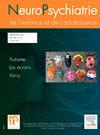Revue systématique des méthodes d’évaluation du traitement sensoriel chez les enfants et adolescents autistes
Q4 Medicine
Neuropsychiatrie de l''Enfance et de l''Adolescence
Pub Date : 2024-11-01
DOI:10.1016/j.neurenf.2024.07.004
引用次数: 0
Abstract
Sensory processing has been a diagnostic criterion for autism spectrum condition since the fifth version of the DSM. However, there is no consensus regarding assessment methods. This article is a systematic review of methods for assessing sensory processing in children and adolescents with autism aged between 0 and 18 years, with three objectives: (1) to identify and organize, using PRISMA, the different methods used in scientific articles for assessing sensory processing in autism; (2) to discuss their advantages and limitations by using the COSMIN checklist; (3) to suggest possible recommendations. Analysis of the 142 articles selected revealed five types of assessment method: questionnaires, psychophysical measurements, electroencephalography, neuroimaging and observation. Questionnaires were the most frequently cited clinical method, while psychophysical tests were the most represented. Each method has limitations in terms of individual utilization due to non-standardized procedures and varied investigation targets. While this systematic review makes it possible to better identify the methods used in the clinical and research fields for sensory processing specificities in children and adolescents on the spectrum, it also highlights the fact that the lack of consensus on assessments is partly due to a problem of definition of this process. Future research will need to agree on a characterization of sensory processing in order to develop a common assessment.
自闭症儿童和青少年感觉处理评估方法的系统回顾
自 DSM 第五版以来,感觉处理一直是自闭症谱系条件的诊断标准之一。然而,对于评估方法还没有达成共识。本文对 0 至 18 岁自闭症儿童和青少年的感觉处理评估方法进行了系统性综述,目的有三:(1)使用 PRISMA 方法识别和整理科学文章中用于评估自闭症儿童感觉处理的不同方法;(2)使用 COSMIN 检查表讨论这些方法的优势和局限性;(3)提出可能的建议。通过对所选的 142 篇文章进行分析,发现了五种评估方法:问卷调查法、心理物理测量法、脑电图法、神经影像学法和观察法。问卷调查是最常被引用的临床方法,而心理物理测试则最有代表性。由于程序不规范和调查对象不同,每种方法在个人使用方面都有局限性。通过此次系统性综述,我们可以更好地确定临床和研究领域针对谱系儿童和青少年感官加工特异性所使用的方法,但同时也强调了一个事实,即对评估缺乏共识的部分原因在于对这一过程的定义问题。未来的研究需要就感官加工的特征达成一致,以便制定共同的评估方法。
本文章由计算机程序翻译,如有差异,请以英文原文为准。
求助全文
约1分钟内获得全文
求助全文
来源期刊

Neuropsychiatrie de l''Enfance et de l''Adolescence
Medicine-Pediatrics, Perinatology and Child Health
CiteScore
0.60
自引率
0.00%
发文量
61
期刊介绍:
Organ of the Société française de psychiatrie de enfant et de adolescent, Neuropsychiatrie de enfance et de adolescence tackles all fields of child-adolescent psychiatry and offers a link between field and clinical work. As a reference and training tool for students and practitioners, the journal publishes original papers in child psychiatry as well as book reviews and conference reports. Each issue also offers a calendar of the main events dealing with the speciality.
 求助内容:
求助内容: 应助结果提醒方式:
应助结果提醒方式:


